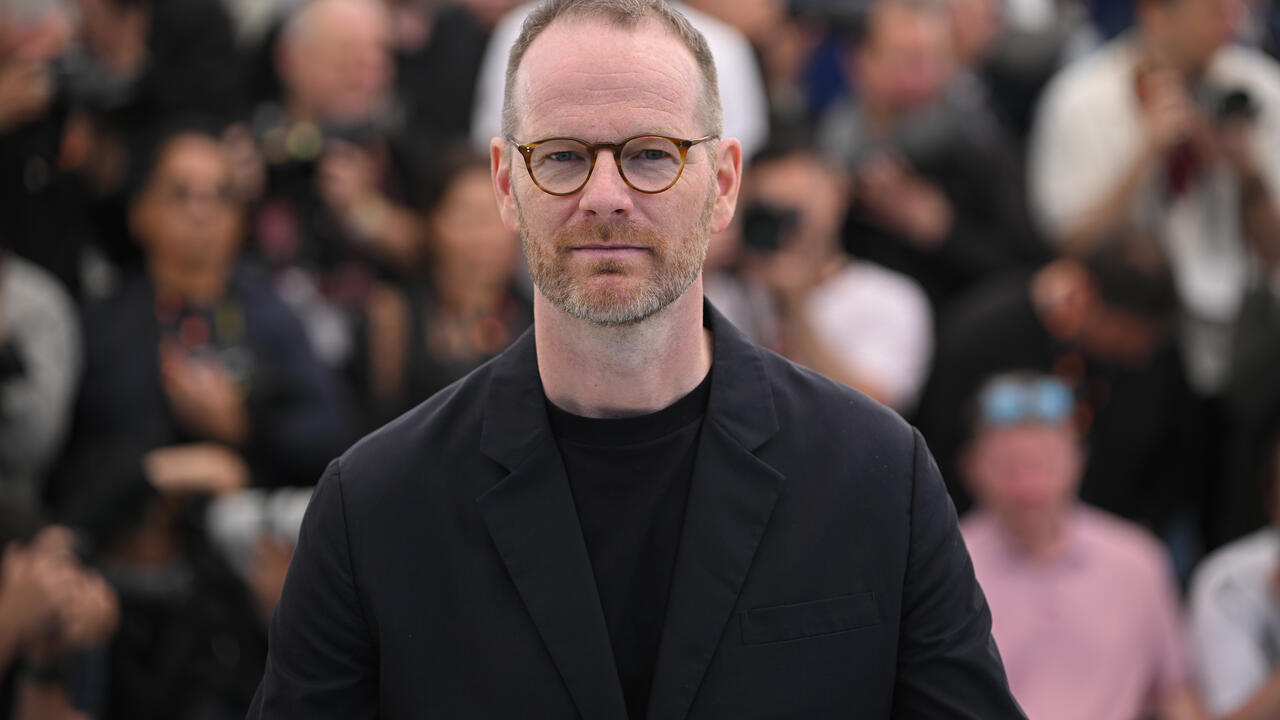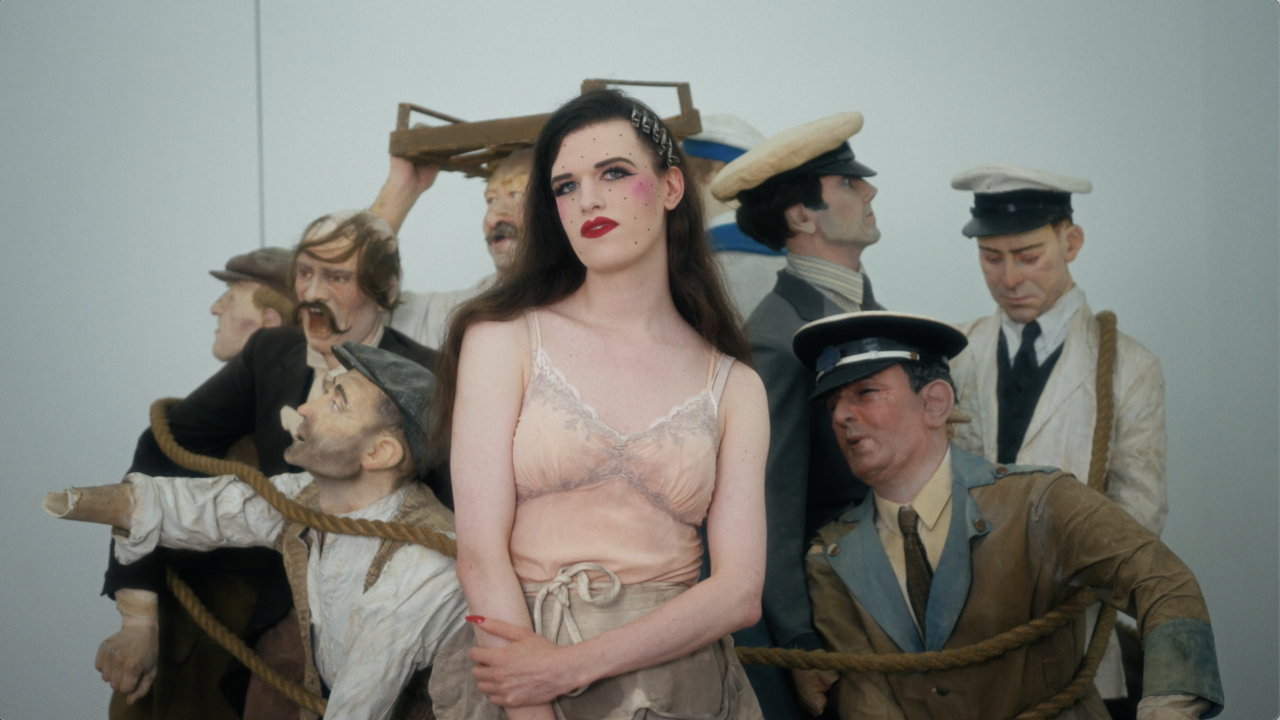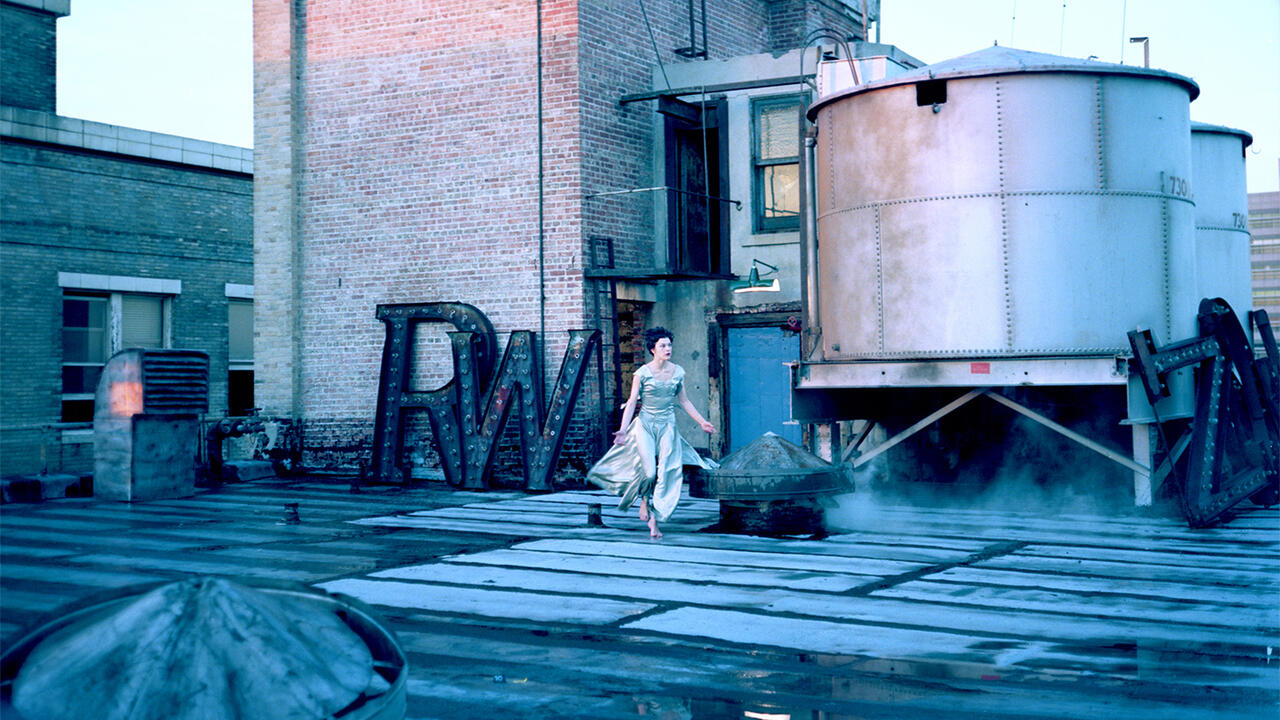In Focus: Rachel Reupke
Taking stock of stock images
Taking stock of stock images

British artist Rachel Reupke’s silent video Wine and Spirits (2013) begins with a close-up of a woman in profile, her hair tied back; she’s looking off-camera as if listening to someone and nods her head almost imperceptibly. There follows a series of short establishing shots that show pints of Guinness being held, first by the woman – at a slightly cocked angle so that the white ‘head’ of the stout acts a little like a spirit level, almost matching the horizontals of the picture frame – and then by her male companion, who holds his glass at a perfect 90-degree angle. After several minutes of glasses being raised and lowered, the woman leans forward and her lips move. At this point, the first intertitle flashes up: ‘Look who’s here.’ The man leans back to see and half his body leaves the frame. He doesn’t respond, but the woman continues: ‘I’m going to the museum this weekend. Do you want to come?’ Again, he doesn’t respond.
The video continues with a series of discrete scenes, each featuring the same actors playing different couples, in which their clothes, body language and choice of tipple change. They sit, stand or lean, surrounded by full, empty or half-empty glasses in elaborately constructed sets, which have been modelled either on advertisements or on fashion photographs. The ‘content’ – the latent emotion conveyed through body language and snatches of conversation displayed on the intertitles – is drawn, according to the artist, from personal experience. The sense of unease in Wine and Spirits doesn’t just come from this meshing together of unrelated source material. Reupke frequently has her actors stare off into the middle distance as she holds a shot for longer than is natural or expected. This creates a kind of surplus into which other emotions can be projected: boredom, hatred, love, regret or disappointment. In the final sequence, the couple, now puzzlingly nursing two half-pints of lager each, sit at a bar. The woman stares into the middle distance as if thinking, while the man looks at her with what could be love or desire. A half smile plays over his lips. Then, very slowly, she turns to face him with an expression that could be contentment. He suddenly appears unyielding and almost spiteful. He says something, which the intertitle indicates was: ‘Don’t get your hopes up.’
For some years, Reupke has been interested in the expressive properties of stock images, advertisements and outtakes. In 10 Seconds or Greater (2009) the artist had four actors perform various scenarios in a non-specific, Ikea-furnished, domestic environment, in the style of stock imagery. The scenes played out are generic enough to be employed for multiple uses. A young black woman sits with a white man and woman on a sofa looking through photographs on a digital camera; the man is then seen cross-legged on the floor, smiling and typing on his laptop. The last five minutes of the 15-minute video are taken up with a variety of drinking scenarios: a male/female couple drink red wine; two men drink beer; two women drink beer; two men drink wine. There are crisps, then crisps and peanuts. The permutations seem endless and completely banal. But, as in all of Reupke’s work, there is a sense in which the artist is attempting to elicit feelings from, or inject meaning and emotion into, forms that have been emptied of these properties. Attuned to the way in which work, social interactions, entertainment and shopping have become intertwined within the same digital technologies, Reupke is on the lookout for the shafts of light that illuminate the points at which this digital hegemony is penetrated by the messy (analogue) world of feelings.

As such, Reupke’s recent work alights on the site of relationships, especially those that unfold in pre-digital social spaces; it is no coincidence that she focuses so much attention on that most analogue of all social lubricants: alcohol. Intoxication as an agent of transformation in the digital realm is also something that is explored in Ed Atkins’s recent work, Ribbons (2014), whose avatar searches in vain for some kind of corporeal fulfilment at the bottom of a CGI cut-glass whisky tumbler. What both artists have in common is a desire to project emotion, sentiment and personal memories onto forms that appear to resist such projections. The spaces of advertising, technologically mediated social relations and computer-generated approximations of ‘real life’ are being mined by many artists today, but rarely with such attention to the thing that is most often left out of these spaces: human frailty.
In Reupke’s Deportment (2011), a couple perch awkwardly behind a small table, on which two empty champagne flutes are set at an odd angle. After some moments, the frame shudders, as if someone has knocked the camera. Everything seems to teeter on the edge of collapse, an effect the artist achieved in part by shooting the video twice, once with the couple and once without. Using the visual effects and compositing software ‘After Effects’, she layered the image of the empty room under the image of the couple and then redrew their profiles using a ‘mask’, giving the woman a button nose and elongated forehead. She then used Photoshop to alter the woman’s jaw line with some skin-tone brush strokes, and adorned the couple with splodges of black paint to sculpt their hair. The unsettling aesthetic and extreme bathos of Deportment is something the artist intends to explore further in a new work, based on images of people writing letters of complaint, which will form the basis of her forthcoming solo show at London’s Cubitt Gallery, opening in January 2015.
The images in Reupke’s work oscillate between movement and stillness. Her work is about this movement, this transition from something still (an ideal) to something moving (reality). Using prosumer editing software, she consistently and deliberately fails to give her images the sheen of an ideal reality that high-grade digital processing has now made possible. Her videos are peppered with moments of stillness and awkwardness. In these instants, when the facade threatens to fall away to reveal the messy analogue reality beneath, there is a kind of digital ‘naked lunch’ moment, which – as Jack Kerouac famously suggested to William Burroughs as the title for his seminal 1959 novel – is that frozen moment when you realize exactly what is on the end of your fork.
Rachel Reupke lives in London, UK. In 2013, she had a solo show at Cell Project Space, London. In 2014, her work has been shown at Ullens Center for Contemporary Art Beijing, China; Museum of Modern Art, Vienna, Austria; Wattis Institute, San Francisco, USA; Tate Britain, London; Whitstable Biennial, UK; and South London Gallery. She has also been nominated for the 2014 Jarman Award. In January 2015, she will ahve a solo exhibition at Cubitt Gallery, London.






















